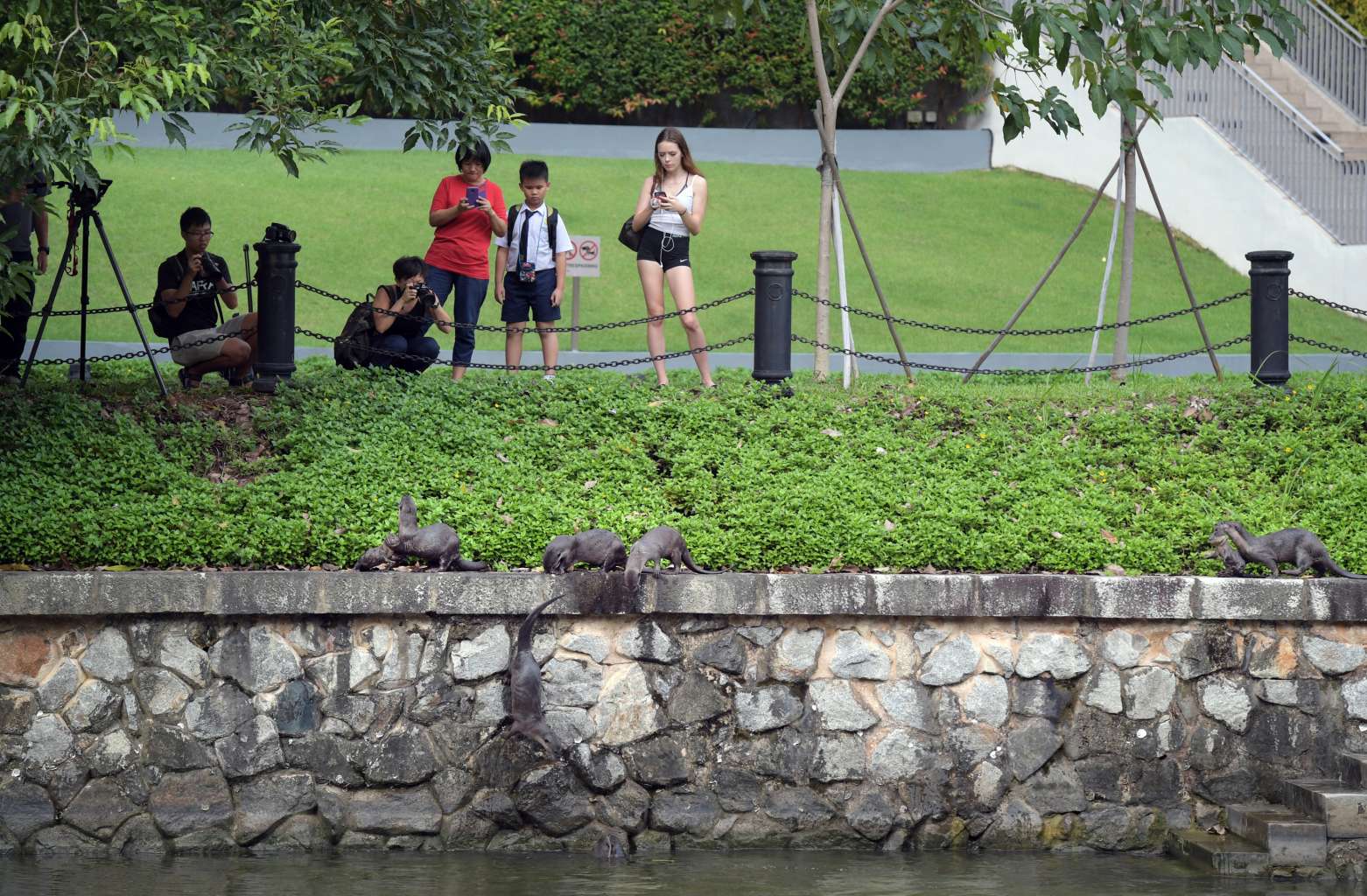To help or not to help: Human intervention in otter family feud sparks online debate
Sign up now: Get ST's newsletters delivered to your inbox

Four new baby otters were at Singapore River on April 10, 2017.
PHOTO: ALPHONSUS CHERN
Timothy Goh
Follow topic:
SINGAPORE - An online debate over whether humans should intervene in fights between animals has been ignited after members of the public stepped in to protect one group of otters from being harassed by a rival family on Sunday (June 11).
Video footage circulated online shows a family of 12 otters from Bishan swimming to Robertson Quay in order to look for another family of otters, also known to the otter-loving community in Singapore as the Marina otters.
Various members of the public are seen making loud noises and waving umbrellas at the Bishan otters to keep them away from the Marina otters' hiding place. The Bishan family eventually retreated about two hours later.
In a Facebook post about the incident, OtterWatch, a platform for otter-lovers to consolidate pictures and information sightings of otters in Singapore, wrote: "Nature would take its course, eventually... but not today. Not during the period when the human community and Marina otter family are still grieving for Marina's recent lost dad."
The post was referring to Ah Huat, the seven-year-old father and alpha male of the Marina otter family who died on June 8 after showing signs of illness such as vomiting, and blood in its dung.
The video drew a mixed response online. While some netizens praised the efforts of the individuals in the video as "heroic", others were more sceptical.
Facebook user Weng Yan Nash commented: "While the intention is good, encouraging/applauding interference with animals in wild settings is not right and sets a dangerous precedent... Already we see people 'condemning' one group as 'evil', who is to say if it will be taken further next time (even with good intentions)."
Both otter families have fought on multiple occasions in the past, with one clash in 2016 resulting in the death of a pup from the Marina otter family. Senior lecturer at the department of biological sciences at the National University of Singapore N. Sivasothi explained that the clashes could likely be part of a drive for territorial expansion, in order to gain access to more food and living space.
The National Parks Board has an advisory on its website advising people to avoid touching, chasing, or cornering otters so as to not scare them.
Mr Jeffery Teo, 46, a vice-president in financial services who has been keenly following both groups of otters for four years, called the intervention an "act of love".
"They prevented two wild otter families from killing each other and lent help to the more vulnerable family," he said, adding that individuals in the video did not harm the otters or take sides.
"If our people had let nature take its own course, we wouldn't be where we are today - in a highly modernised urban space, with beautiful and 'naturalised' man-made rivers, neatly planted trees in our parks for all of us to enjoy. We already decide when nature should take its own course, and when humans should take control over nature."
Mr Teo said that the two families fought again on Monday afternoon - this time, however, there was no intervention as the Marina family decided to jump into the water to engage with the Bishan family.
"Earlier we tried to make sure the weaker ones had a helping hand, but this time because (they) decided to jump in, there's nothing we can do... let nature take its course," he said.
The Straits Times understands one pup from the Marina family is now missing.
Mr Sivasothi said that he was "heartened" by the attempts of members of the public to prevent the fight.
He felt that this response was better than "the usual response of fear and ignorance" by a minority of people, who call for the culling of wild animals instead.
He also noted that such fights happen frequently among animals like cats, dogs and birds, but as they are often out of sight, the public is not aware of them and therefore does not have a strong reaction to them.
However, in cases where humans attempt to intervene in conflicts between animals, Mr Teo stressed that human safety is a priority, and that common sense must be applied.
"Don't go overboard, or try to do anything to the animals," he said.

